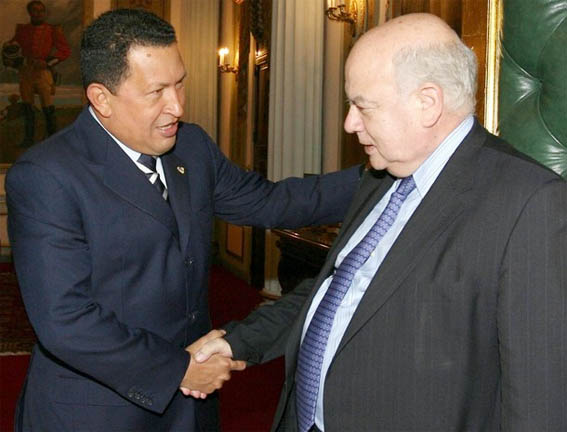Venezuela starts the year in the middle of a polemic new “Law of Universities”[es] and a questioned “Enabling Law.” Months ago, the Venezuelan people went again to the polls to choose a new National Assembly where the opposition won a majority of the votes (52%), but not the majority of seats due to the reform of the Organic Law of Electoral Processes.
Under this scenario the deputies were ready to take possession to assume charge and execute their duties in the new National Assembly on January 5th 2011. However, on December 17th the ruling National Assembly approved an Enabling Law that grants President Hugo Chavez the power to rule by decree until the middle of 2012, electoral year for the presidential elections. Deputy Carlos Escarrá explains that the Chief Executive asked for this [es], “to face in a more efficient and effective way the calamity caused by the rains.” Venezuela was severely affected by strong rains at the end of 2010.
Blogger Miguel Octavio from The Devil's Excrement believes that the Enabling Law is a “pantomime” of president Chávez.
[…] the last thing he truly needs is an Enabling Law to confront and deal with the recent floods.This is all a pantomime by Hugo, a show for the gallery that he expects will make him look like the hero he is not.
Because if he had any clue as to how to attack the emergency and the crisis he would ask some very basic questions: Who, with what and how?
And neither of these requires legislation.
Miguel continues,
He needs the Enabling Bill, because he knows the opposition will cry bloody murder and then he can point to how heartless they are and how they don’t care for the “people”.
The Enabling Law before the OAS
The secretary general of the Organization of American States (OAS), José Miguel Insulza, has put in doubt the democratic character of the law, something that irritated president Chávez who declared [es]: “To mister Insulza I will respond from now on, I will not even ignore you because this is shameful.” The Bolivarian Republic of Venezuela is a member of the Organization of American States (OAS), which has as one of its goals as a regulatory entity to promote and consolidate democracy.
Likewise, the Venezuelan chancellery emitted a press release where it vigorously condemned Insulza's opinion [es]. The text states that these attacks constitute “a new, abusive and opportunistic act of interference that discredits even more the Secretary General of the OAS”.
Under this tense environment between President Chávez and the OAS, on January 12th opposition deputies met in Washington DC with the executive Secretary of the Inter-American Commission on Human Rights of the Organization of American States, Santiago Cantón, and with the Secretary General of the organization, José Miguel Insulza. The attendees qualified the meeting as positive. The letter [es] presented by the deputies remarks the “Weakening of Venezuelan democracy, the disregard for the popular will expressed during the parliamentary elections the past 26th of September of 2010″ among other things.
Elsewhere, El Nacional reports [es] on the night of January 13th that Secretary General José Miguel Insulza,
[…] no pidió que se modifique la Ley Habilitante en Venezuela o que el organismo tome alguna decisión al respecto.
“Ahora decidir si se discutirán estas posturas es algo que corresponde a los países miembros” de la OEA.
Twitter user Juan M (@juanMarx66 [es]) refers to National Assembly candidate Jorge Amorin (@jorgeamorin [es]) and deputy for the opposition Ismael García (@ismaelpodemos28 [es]) who were present for the meeting on January 12th when he says:
ahora hay q ver q van a decir, xq Insulza los acaba d dejar es mal jaja,osea la visita a la OEA fue un fracaso
Twitter user @ladivinadiva [es] observes:
Seamos francos, la OEA en los sesenta, no hizo nada frenta a Cuba, mas que meter la pata, no se va a meter en Venezuela
Twitter user “uranioEduardo madrid” (@eldiafano [es]) says:
José Miguel Insulza.(OEA), le comunico a los parlamentarios venezolanos, ustedes no me trajeron nada fuera de lugar,la habilitante es legal
Maria Belen Otero (@mariabelenotero [es]) declares on Twitter:
La verdad ya no espero nada de la OEA y mucho menos de Insulza
Venezuela finds itself in a conflict where the opposition is looking for support from international entities and expects some reaction from the neighboring countries members of the OAS. At the end it will be them, as indicated by secretary José Miguel Insulza, that will have the last word in this power conflict between the opposing segment of the National Assembly and president Chávez over the “Enabling Law.”







